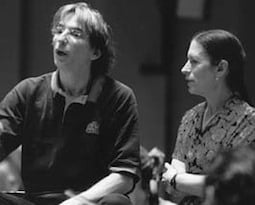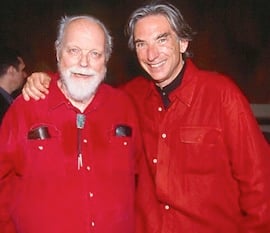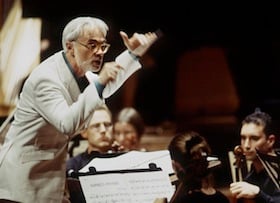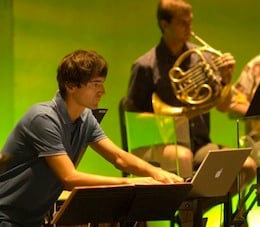
Catherine Payne, the San Francisco Symphony’s piccolo player, has always been jealous of singers. She envies the direct emotional connection they make with audiences.
“As instrumentalists, we’re always trying to imitate the sound of the human voice,” says Payne, who will literally sing into her piccolo when she plays Meredith Monk’s new composition, Realm Variations, written for her. One of four works commissioned by the Symphony for its expansive American Mavericks festival, it premieres at Davies Symphony Hall on March 18.
Monk — whose unbounded singing will be heard March 10 and 14, when she joins fellow experimental vocalist Joan La Barbara and soprano Jessye Norman in a theatrical presentation of John Cage’s Song Books — composed the piece after talking with Payne and listening to excerpts of her playing. Payne wanted a work that tapped the melodic capabilities of an instrument that often plays a percussive role. She sent Monk excerpts of Shostakovich’s Symphonies 6, 8, and 10, with their hauntingly beautiful piccolo solos.

Scored for six voices and seven instrumentalists, Realm Variations, which draws inspiration from the three realms of Buddhist cosmology, opens with a serene and beautiful piccolo solo that’s a call to prayer. Later, in a duet with Monk, Payne plays microtonal pitches while simultaneously singing through her instrument. (Microtones are the pitches “in between” the smallest pitch gradation in the Western classical scale.) Among other things, the score instructs her to “bend from one note to the next, exploring microtones.” Monk’s part calls for microtonal crying.
“Wish me luck! This is not my bread and butter,” says Payne, a high-spirited woman who loves the challenges posed by this piece. She played a lot of contemporary music in Boston before Michael Tilson Thomas brought her to San Francisco in 1996. (It was Tilson Thomas who suggested Monk write a piece for piccolo and introduced her to Payne.) “But I haven’t done this in a while. I’ve got to get my extended technique chops together again,” she adds with a laugh. “We have to practice our microtonal crying.”
A Canon for the 21st Century

Like others in the orchestra, which has championed new and outsider music under MTT’s sparkling leadership, Payne is jazzed about playing the pieces in this far-ranging festival, which opens Thursday, March 8, with performances of Copland’s Orchestral Variations, Lou Harrison’s thrilling Concerto for Organ with Percussion Orchestra, and Ives’ transcendent Concord Symphony (the “Concord” Piano Sonata orchestrated by another maverick, Henry Brant).
The festival, which plays here for 10 days before touring to Chicago, Ann Arbor, and Carnegie Hall, builds on the smashing success of the first American Mavericks in 2000. (That was before “Sarah Palin and John McCain ruined the word maverick for us,” Payne says.) That festival featured music by many of the daring and innovative composers being celebrated this time around, too: Ives, Cage, Copland, Henry Cowell, Morton Feldman, Steve Reich, John Adams, and David del Tredici.
“It was an exhilarating ride to have something completely different to play every day,” says Jack Van Geem, the Symphony’s longtime principal percussionist, who participated in the first festival and is primed to play this one. “It’s good to shake things up a little.”
He and his colleagues have performed much of the Mavericks repertoire before, including the Harrison, Carl Ruggles’ incandescent Sun-treader, and Edgard Varèse’s massive, sonically assaulting Amériques, which Payne calls “crazy and great, a huge wall of sound,” and which Van Geem says has “a certain rock ’n’ roll rawness to it, with a wonderful rhythmic intensity.”
He’s eager to dig into those great works again, as well as pieces he’s never played, among them Adams’ new Absolute Jest. Co-commissioned by the Symphony and Carnegie Hall, it features the orchestra and the St. Lawrence String Quartet in what Adams calls the “world’s longest scherzo,” with the quartet playing Beethoven, “but Beethoven that’s been passed through a hall of mirrors.”
Van Geem will play chromatic cowbells, and plans to bring some cylindrical Noah Bells, made in India, to rehearsal for Adams to hear.
“As instrumentalists, we’re always trying to imitate the sound of the human voice.” – Catherine Payne
“He wanted to have some other sounds, so we’ll see if he likes those,” says Van Geem, who’d suggested percussion changes to Adams’ opera The Flowering Tree that the composer adopted. “We’re also going to experiment with laying chimes on a table to try to get some other sounds.”
The Adams piece premieres March 15, 16, and 17 with another commissioned work, Mass Transmission, written for organ, chorus, and electronica by the hot young Oakland-based composer Mason Bates. They share the bill with the Varèse, and Feldman’s floating Piano and Orchestra, featuring Emanuel Ax, which MTT describes as a cross between Anton Webern and Duke Ellington, “a kind of nocturne that hovers in fields of color.”
Dealing With the Byzantine
Van Geem will have his hands full playing Lukas Foss’ 1963 work Echoi, an intricate and demanding quartet piece that he’s never heard. He’s playing it with pianist Jeremy Denk, cellist Peter Wyrick, and clarinetist Carey Bell.

“That’s the one that’s going to be difficult for me,” Van Geem says. The piece calls for an assortment of drums, muted gongs, vibraphone, cymbals, woodblocks, wind chimes, and sandpaper, plus a bit of improvisation. “It’s a 25-minute work with very dense and carefully coordinated parts. It will require a fair amount of rehearsal to make sure we catch all our winks and nods. … There are a lot of interesting colors and effects.”
The percussion score includes markings such as “play a-periodically” or “mimic the cello and clarinet.” “The other musicians’ parts are written out. I think Foss just got a little lazy,” Van Geem says with a laugh. Every contemporary percussion piece, he adds, “kind of invents its own instrument. The first thing you have to do is become familiar with the instrument that has been called for, and assemble it into a form that feels like it’s ergonomically viable. Once you get that, you can start to learn the piece.”
Like Van Geem, principal bassoonist Stephen Paulson loves playing the big pieces like Amériques and the Ives (he says the Brant-orchestrated Concord “is as good as or better than any of the four Ives symphonies”). The Mavericks festival piece he finds most challenging is del Tredici’s Syzygy, written in 1966 for chamber orchestra, solo voice, solo French horn, and two bells.
“The parts look as close to unplayable as anything I’ve seen,” Paulson says wryly. He’s chatting in a Davies Hall dressing room with principal violist Jonathan Vinocour and associate principal horn Nicole Cash, who are also playing Syzygy. “It’s all standard notation, but it’s very complex standard notation. Everything is sliced and diced to the nearest 64th note, with people playing different things that have to line up one 64th note after the other person at very fast tempos.”
“It’s good to shake things up a little.” – Jack Van Geem
But once they begin rehearsing the piece with Thomas, “we’ll get a sense of how it goes,” says Cash, who agrees that the parts looks complicated on the page. Vinocour has listened to a recording of Syzygy and liked it. “It was more atmospheric-sounding to me than it appears on the page,” he says. “When I saw the music, I thought, Wow, all that textural stuff is really intricately notated.”
A Little Theatrical Flair

Paulson is more sanguine about playing the Cage, which will require him to make a few musical and theatrical choices. He expects to get some help from MTT and stage director Yuval Sharon, “who will tell us we can do this or that, and we’ll just go out and do it. It will bring me back to the ’60s and happenings and that sort of thing. I’m looking forward to hearing it.”
There have been times when Paulson initially didn’t like a piece of new or unfamiliar music, but ended up loving it after he played it. He’s learned not to have expectations.
“Sometimes we’ll come into the first rehearsal rather skeptical, and things will be a little chaotic. But we trust Michael to really get the music together and sell it. And by the time the performance comes around, most orchestra members are really excited about playing the music.”
Playing the Mavericks repertoire, Cash adds, “pushes and challenges us technically and artistically. We have to listen to each other in different ways. It stretches us.”
Van Geem feels the same way. He shares his colleagues’ admiration for MTT’s gift for talking to audiences and drawing them into music that many find daunting.
“He has a remarkable talent for making them feel like they’re part of something special, even if they don’t necessarily understand it,” says Van Geem, who thinks the festival is vitally important for musicians and audiences.“It’s important to keep the art form alive and moving forward, and not just play the dead guys all the time.” – Catherine Payne
“I think we need the variety that something like the Mavericks can bring, to let us hear other ways of organizing pitches, organizing rhythms, organizing sound. It gives a really good perspective on the entire canon of Western music.” (And adds to it.)
“These commissions are really important,” Payne says. “It’s important to keep the art form alive and moving forward, and not just play the dead guys all the time.”
